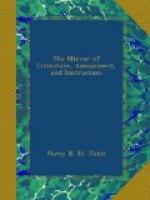He was awakened by a noise resembling the strokes of many hammers. He conceived his senses must be wandering, for he found that he was at the entrance of the amphitheatre of rocks near the dwelling of the solitaire. The same group of figures appeared, and it was not long before a voice, which he knew to be that of Heidelberger, slowly repeated the following chant:—
Woe to him who dares intrude
Upon our midnight solitude!
Woe to him whose faith is broken—
Better he had never spoken.
’Ere twelve moons shall pass away,
Thou wilt he beneath our sway.
Drear the doom, and dark the fate
Of him who rashly dares our hate!
Deceive me once, I tell thee never
Shall thy soul and body sever!
Under the greenwood wilt thou lie,
Nor shall thou there unheeded die.
Mortal, thou my vengeance brave,
Thou had’st better seen thy grave.
Drear the doom, and dark the fate
Of him who rashly dares our hate!
Meanwhile the Baron had sunk into a state of insensibility. When he awoke from his trance it was broad daylight, and the birds were singing merrily around the ruin.
After this adventure, the Baron resumed many of his old habits; and sought by deeper dissipation to dispel the visions of the past. His son was now grown up a sickly youth, and his father’s inquietude about him was so great that he would not suffer him for a moment to be out of the sight of his attendants.
The year rolled on without any harm befalling the Baron, and his spirits lightened as the time advanced. He had almost forgotten the circumstance, when on the day preceding that of the anniversary of the adventure just related, a grand hunting party was proposed, it being the birth-day of his son. We now return to the situation in which we left the Baron at the beginning of this legend.
The forest seemed to the exhausted Rudolf, almost interminable, and this provoking horn perplexed him sadly. On this night the dreaded twelve-months expired. The bare thought made him redouble his speed. The darkness seemed increasing, and the flapping of the bats and hoarse croaking of the night birds, disturbed by his progress through the branches, did not add to his comfort; when to his great joy, he felt a strong current of air, and found that he had at last apparently emerged from the thickest of the forest. The moon was now beginning to cast her “peerless light” over the scene, and Rudolf perceived he was in an extensive amphitheatre or opening of the trees, which he could not recollect ever having seen before, bounded at a short distance by what seemed a small lake, near the centre of which grew a large and solitary pine.
The moon had now fully risen. Hans who had been flagging for some time, fell suddenly lame. From this fresh misfortune the Baron was aroused by the well known baying of his gallant stag-hounds. “Aiglette and Caspar are not baying after nothing,” thought he. He was not long in suspense. To his extreme amazement, the identical boar which had caused all his trouble and fatigue, appeared closely followed by both the dogs.




